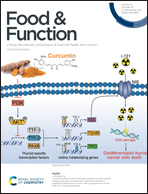Chitosan oligosaccharide attenuates endoplasmic reticulum stress-associated intestinal apoptosis via the Akt/mTOR pathway†
Abstract
Endoplasmic reticulum stress (ERS) and apoptosis are widely considered as essential factors associated with intestinal disorders, whereas nutritional therapeutic approaches targeting ERS may control disease activity. Thus, we focus on the potential benefit of chitosan oligosaccharide (COS) on repressing ERS and ERS-induced apoptosis. In this study, we used the ERS model with tunicamycin (TM)-induced IPEC-J2 cells in vitro and nutrient deprivation-induced ERS in piglets to evaluate the protective mechanism of COS against ERS and ERS-induced apoptosis. The results showed that cells were characterized by activation of the unfolded protein response (UPR) and increased epithelial apoptosis upon exposure to TM. However, these changes were significantly attenuated by COS and the expressions of Akt and mTORC1 were inhibited. Furthermore, a specific inhibitor of mTOR confirmed the suppression of Akt and reduced the activation of the UPR and apoptosis. In vivo, COS protected against nutrient deprivation-induced ERS in the jejunum of piglets, in which the overexpression of the UPR and apoptosis was rescued. Consistently, COS attenuated nutrient deprivation-induced disruption of intestinal barrier integrity and functional capacity. Together, we provided the first evidence that COS could protect against intestinal apoptosis through alleviating severe ERS, which may be related to the inhibition of the Akt/mTOR signaling pathway.



 Please wait while we load your content...
Please wait while we load your content...